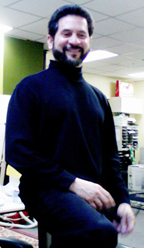For very long time I hadn’t read a so such clear and exact description of our reality as people living in our current society under the current government and system. I am so thrilled to share it with our readers. The Illusion of Freedom, authored by Chris Hedges, is definitely a powerful article that every political conscientious person who likes to challenge the status quo and to contemplate new ideas and visions for humanity that everyone must read. SECOND OF A 2-PART SERIES.
The Illusion Of Freedom
by Chris Hedges
Who funds and manages our elections? Who writes our legislation and laws? Who determines our defense policies and vast military expenditures?
The essential component of totalitarian propaganda is artifice. The ruling elites, like celebrities, use propaganda to create false personae and a false sense of intimacy with the public.
— The emotional power of this narrative is paramount. Issues do not matter. Competency and honesty do not matter. Past political stances or positions do not matter. What is important is how we are made to feel. Those who are skilled at deception succeed. Those who have not mastered the art of deception become “unreal.” Politics in totalitarian societies are entertainment. Reality, because it is complicated, messy and confusing, is banished from the world of mass entertainment. Clichés, stereotypes and uplifting messages that are comforting and self-congratulatory, along with elaborate spectacles, replace fact-based discourse.
“Entertainment was an expression of democracy, throwing off the chains of alleged cultural repression,” Neal Gabler wrote in “Life: The Movie: How Entertainment Conquered Reality.” “So too was consumption, throwing off the chains of the old production-oriented culture and allowing anyone to buy his way into his fantasy. And, in the end, both entertainment and consumption often provided the same intoxication: the sheer, endless pleasure of emancipation from reason, from responsibility, from tradition, from class and from all the other bonds that restrained the self.”
The more communities break down and poverty expands, the more anxious and frightened people will retreat into self-delusion. Those who speak the truth—whether about climate change or our system of inverted totalitarianism—will be branded as seditious and unpatriotic. They will be hated for destroying the illusion. This, as Gabler noted, is the danger of a society dominated by entertainment. Such a society, he wrote, “… took dead aim at the intellectuals’ most cherished values. That theme was the triumph of the senses over the mind, of emotion over reason, of chaos over order, or the id over the superego. … Entertainment was Plato’s worst nightmare. It deposed the rational and enthroned the sensational and in so doing deposed the intellectual minority and enthroned the unrefined majority.”
Despair, powerlessness and hopelessness diminish the emotional and intellectual resilience needed to confront reality. Those cast aside cling to the entertaining forms of self-delusion offered by the ruling elites. This segment of the population is easily mobilized to “purge” the nation of dissenters and human “contaminants.” Totalitarian systems, including our own, never lack for willing executioners.
Many people, maybe even most people, will not wake up. Those rebels who rise up to try to wrest back power from despotic forces will endure not only the violence of the state, but the hatred and vigilante violence meted out by the self-deluded victims of exploitation. The systems of propaganda will relentlessly demonize those who resist, along with Muslims, undocumented workers, environmentalists, African-Americans, homosexuals, feminists, intellectuals and artists. The utopia will arrive, the state systems of propaganda will assure its followers, once those who obstruct or poison it are removed. Donald Trump is following this script.
The German psychoanalyst and sociologist Erich Fromm in his book “Escape From Freedom” explained the yearning of those who are rendered insignificant to “surrender their freedom.” Totalitarian systems, he pointed out, function like messianic religious cults.
“The frightened individual,” Fromm wrote, “seeks for somebody or something to tie his self to; he cannot bear to be his own individual self any longer, and he tries frantically to get rid of it and to feel security again by the elimination of this burden: the self.”
This is the world we live in. The totalitarian systems of the past used different symbols, different iconography and different fears. They rose up out of a different historical context. But they too demonized the weak and persecuted the strong. They too promised the dispossessed that by subsuming their selves into that of demagogues, or parties or other organizations that promised unrivaled power, they would become powerful. It never works. The growing frustration, the ongoing powerlessness, the mounting repression, leads these betrayed individuals to lash out violently, first at the weak and the demonized, and then at those among them who lack sufficient ideological purity. There is, in the end, an orgy of self-immolation. The death instinct, as Sigmund Freud understood, has a seductive allure.
History may not repeat itself. But it echoes itself. Human nature, after all, is constant. We will react no differently from those who went before us. This should not dissuade us from resisting, but the struggle will be long and difficult. Before it is over there will be blood in the streets.



